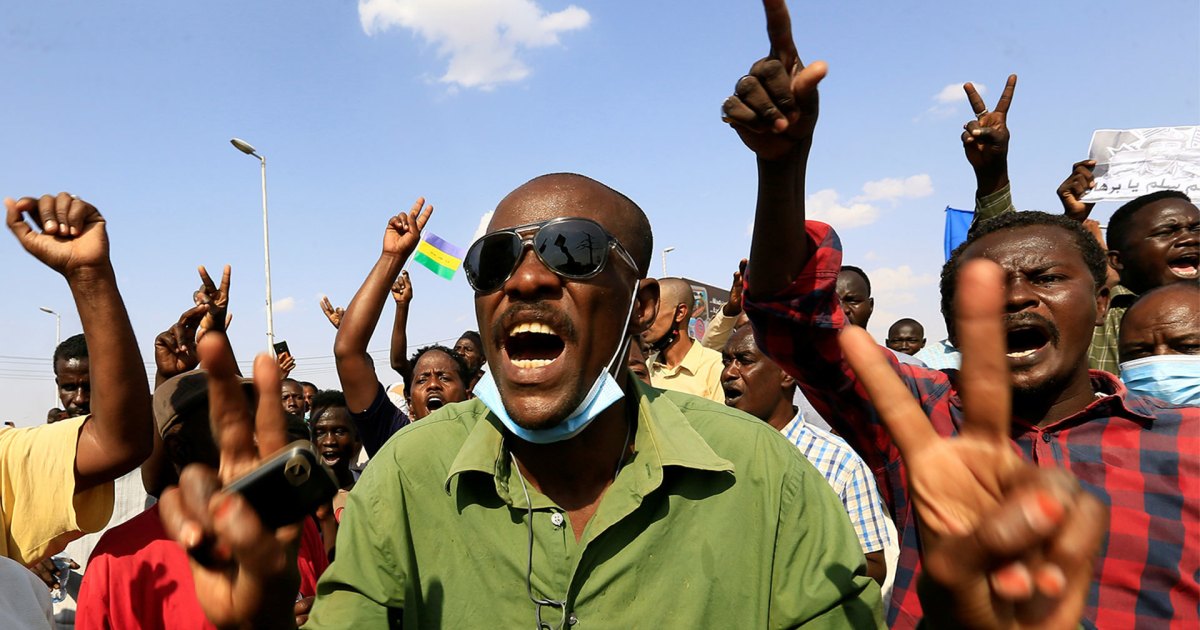The Transitional Sovereignty Council in Sudan said that the US envoy, Jeffrey Feltman, presented proposals to resolve the current political crisis, and the Chairman of the Council, Abdel Fattah Al-Burhan, promised to study them with Prime Minister Abdullah Hamdok.
According to a statement by the Sovereignty Council on Sunday evening, Al-Burhan, during his meeting with Feltman, the US special envoy for the Horn of Africa, praised the US administration’s support and interest in the success of the transitional period. He also stressed his keenness to work with political forces to overcome all obstacles and challenges to end the current crisis.
The statement added that Al-Burhan renewed the Sudanese army's commitment to protecting the transitional period and working in accordance with the Constitutional Document and the Juba Peace Agreement, leading to free and fair elections and a full civilian democratic transition.
For his part, the Sudanese Cabinet said in a statement that Feltman expressed his optimism about the possibility of finding a way out of the current crisis in a way that enhances the path of civil democratic transformation in Sudan, and completes the benefits of the Constitutional Document and the Juba Agreement for Peace in Sudan, in a manner that achieves the aspirations of the Sudanese people.
The Sudanese Prime Minister's office indicated in a tweet on Twitter that Prime Minister Abdullah Hamdok met the American envoy in Khartoum 3 times within two days, and discussed with him ways to get out of the current crisis.
On the other hand, the United Nations Mission in Sudan is seeking to develop a road map agreed upon by all parties in the country, according to a statement by the Sovereignty Council following a meeting held by Council member Shams El-Din Kabbashi in Khartoum with the head of the UN mission, Volker Peretz.
Weeks ago, tension between the military and civilian components of the transitional authority escalated, following criticism from the military leaders of the political forces against the backdrop of thwarting a coup attempt on September 21, and the controversy over power-sharing arrangements during the transitional period.
Hit and run
Meanwhile, supporters of the "Forces of Freedom and Change-National Charter Group" continued their sit-in in the vicinity of the Republican Palace in Khartoum, amid hit and run between the police and demonstrators who blocked roads and bridges.
For the ninth consecutive day of their sit-in, the protesters renewed their adherence to their demands represented in dissolving the transitional government, forming a government of competencies, and expanding the base of political participation, or what they call a return to the first founding platform.
In a speech before the sit-in, the prominent leader of the "National Compact Group" Minni Arko Minawi - who is the governor of Darfur and head of the Sudan Liberation Movement - said that his movement would not accept what he called a "civilian monopoly" by a specific group.
On the other hand, the leader of the "Forces of Freedom and Change-Central Council" Moataz Salih described the closure of main streets and bridges in Khartoum as an attempt to obstruct the progress of the country's affairs.
The Sudanese police reopened the "Al-Mak Nimr Bridge", which links the center of Khartoum with the city of Khartoum North, after a group of protesters closed it for a few hours near the Republican Palace.
The police used tear gas to disperse the protesters on the bridge, and other groups of protesters had closed a number of main roads in the capital, especially the Nile, Al-Jamaa and Al-Qasr streets, in whole or in part.
East Crisis
Meanwhile, the repercussions of closing vital facilities in eastern Sudan continue, as a Sudanese government source told Al Jazeera that the wheat flour reserve in Khartoum will be zero as of Monday morning, and that fuel will run out in the capital as of next Thursday due to the closure of the ports.
The source confirmed that in light of the crisis of closing the national road in the east of the country, Khartoum receives 8,000 bags of flour daily from the central chamber, equivalent to 25% of the consumption of Khartoum state.
He explained that the authorities are seeking to use the stocks of the Northern State or the United Nations wheat in Port Sudan for aid, as the Minister of Irrigation Yasser Abbas, who is currently in Port Sudan, is seeking an envoy from the Prime Minister to save the situation.
For his part, the head of the Supreme Council of Beja Opticals and Independent Amaudities in eastern Sudan, Muhammad Al-Amin Turk, said in a statement to Al Jazeera that he does not expect any solution to the crisis in eastern Sudan in light of the differences that hit the government with its civilian and military components.
But at the same time, he welcomed the government's sending a delegation to negotiate with the council.
Turk considered that the government's resort to alternative ports is a "language of war", adding that the council does not have arms, but is keen to extract the rights of the people of the East, which he said are legitimate and just.
The council had imposed a closure on the Red Sea state's ports, railways, and a pipeline for transporting oil derivatives to Khartoum, as well as the road linking Port Sudan and other cities, in order to pressure the government to achieve a number of demands.

